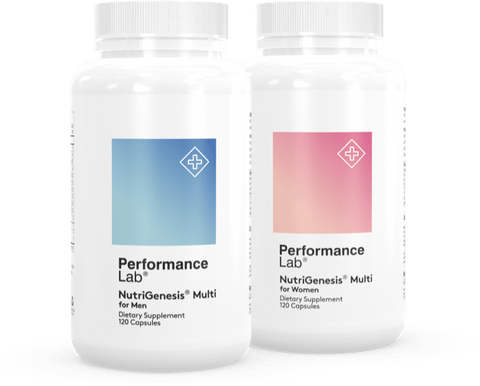Acne is not something that most people typically welcome. It’s a nuisance, embarrassing, and uncomfortable… and no one wants to deal with it.
While acne can be caused by many factors - diet, toxins, hormones, genetics - prescription medications aren’t the only solution.
If you’ve heard about vitamin A, chances are it concerns vision. It’s a fat-soluble vitamin essential for the optimal performance of all body systems - and it may be helpful for people struggling with acne and other skin conditions.
Because of its role as a powerful antioxidant, vitamin A might promote healthier skin by fighting free radical damage and inflammation - an underlying factor of acne vulgaris.
If you’re looking to treat acne with vitamin A, topical formulas appear most effective, but increasing your intake through diet and a supplementary multivitamin never hurts.
Vitamin A might be a good solution for anyone struggling with acne, so we’ve looked through the research, and we’re giving you everything you need to know about vitamin A for acne.
What is Vitamin A?
If you’ve heard of vitamin A, there’s one of two things it’s probably about: skin health or vision. It’s an essential nutrient for both but plays several other important biological roles in the body.
While commonly referred to as a single vitamin, vitamin A denotes a group of fat-soluble compounds that includes retinol, retinal, and retinyl esters 1, 2. And from skin health and vision to immune function and reproduction, vitamin A is needed for them all.
You’ll find vitamin A in two forms:
- Preformed vitamin A (retinol)
- Provitamin A (carotenoids)
The former is the active form of vitamin A derived primarily from animal foods 1. The active forms of vitamin A are then converted to retinoic acid, retinal, and retinyl esters, the only nutrient forms that can be utilized immediately.
On the other hand, Carotenoids are a group of over 750 naturally occurring plant pigments that give fruits and vegetables their hues of red, orange, and yellow. Unlike the active form of vitamin A, carotenoids must convert to retinol before being used 3.
Due to its widespread use throughout the body, a vitamin A deficiency is classified more as a disorder than simply a deficiency—it’s called vitamin A deficiency disorder (VAD), and it can result in severe consequences.
Keep in mind that as important as vitamin A is for physiological function, you don’t want to overdo it. While excess B vitamins may easily be excreted, vitamin A isn’t.
It’s a fat-soluble vitamin that’s stored in body tissues, primarily in the liver, primarily as retinyl esters, which are broken down and bind to retinol-binding protein before entering the bloodstream when vitamin A levels drop 4, 5. Once it makes its way into systemic circulation, it’s free to do its job.
Vitamin A and Skin Health
Although the classical role of vitamin A is vision, it’s also a top dog when it comes to skin health. Retinol, the active form of vitamin A, is a common ingredient in skincare products thanks to its ability to renew skin cells, protect collagen, promote collagen and elastin production, and plump up deep layers of the skin to reduce fine lines and wrinkles.
Sounds like a dream supplement for the skin, right? It’s also sometimes used to treat acne and acne-related scarring. And if you’re planning to use vitamin A topically, it can double as an exfoliant, helping to improve the texture and tone of skin and remove dead cells from the surface.
But before you hit the road to get some retinol, know the different kinds. The two most common types of vitamin A supplements you’ll find are:
- Retinoic acid (prescription-only)
- Retinol (over-the-counter, OTC)
Retinoid acid is more potent than retinol and is, therefore, only available via prescription.
There’s really no shortage of what vitamin A can do for skin health, and it’s one of the more extensively studied skin vitamins, so let’s dig into its benefits, both as preventative and anti-aging options.
1. Boosts skin cell turnover
If you want radiant, smooth skin that everyone is jealous of, ridding the old, dead skin cells and making room for new, healthier ones are essential—and vitamin A can support it.
It promotes the shedding of old skin cells and stimulates the regeneration of newer, healthier, and smoother cells 6. In technical terms, vitamin A enhances epidermal cellular turnover.
2. Improves skin texture and tone
Have you ever looked at your skin and thought it looked rough, bumpy, and uneven? Radiant skin starts with an even and smooth skin tone, and because vitamin A acts as an exfoliant, it can help to even out the tone and texture on the skin’s surface. It’s also great for combating hyperpigmentation 7.
Studies show that retinoids effectively treat pigmentation disorders like melasma and post-inflammatory hyperpigmentation by tyrosinase and epidermal melanin dispersion.
They may also interfere with pigment transfer to keratinocytes and accelerate pigment loss by increasing the speed at which the epidermis is shed. When used long term, retinoids can also decrease melanin content.
3. Stimulates collagen production
For radiant and strong skin, you need all layers of the skin to be healthy—that means not just the epidermis (the top layer) but also the dermis (the deeper layer). A weak dermal skin structure contributes to fine lines and wrinkles, sagging skin, and aging, which can leave the skin looking old and dull.
However, vitamin A is unique because it works on both layers of the skin, keeling to stimulate collagen production to keep the skin healthy, elastic, and tight 8. It does this in naturally aged, sun-protected, and photoaged (sun-damaged) skin 9.
4. Reduces fine lines and wrinkles
Are fine lines and wrinkles making you look older than you are? Sounds like it’s time to get some vitamin A on your skin!
As we just mentioned, vitamin A can help reduce fine lines and wrinkles and improve the skin’s thickness, making for younger and healthier-looking skin.
And if that wasn’t enough, vitamin A can minimize the destruction of existing collagen and elastin, which gives you an even bigger bang for your buck 6.
5. Effective acne treatment
Regardless of the severity, acne is never a joy to deal with—nor does it do much for your confidence.
While there are several acne medications and medicated skin cleansers targeted at acne-prone skin, something as simple as vitamin A may do the trick—but the efficacy of vitamin A for acne depends on where it’s from and how it’s used.
A vitamin A-rich diet supports healthy skin from the inside out, but topical retinol applications may directly treat acne.
But why is it so effective? Studies show that it can:
- Reduce inflammation
- Promote skin cell regeneration to heal lesions and scars
- Reduce sebum production
- Smooth skin
- Even skin tone
- Fight free radicals to protect against environmental damage
The topical application of vitamin A for acne is supported by research, but the studies on oral ingestion for acne aren’t conclusive. Some older research suggests that oral vitamin A was ineffective for treating acne but may help prevent acne from getting worse 10.
However, a more recent study found that oral vitamin A was effective for treating acne, but study limitations question its validity 11.
6. Treats post-inflammatory hyperpigmentation
Have you ever been embarrassed by discolored skin after you get rid of a blemish? Studies suggest that prescription-strength vitamin A minimizes the look of post-blemish discoloration.
Retinoids exert several biological effects that can help to lighten skin, including modulating cell proliferation, differentiation, and cohesiveness; inducing cell apoptosis; and promoting the expression of anti-inflammatory properties 12.
Side Effects of Vitamin A
While vitamin A appears to have some pretty hefty benefits for skin health, it’s not all good news—these powerful effects come with potentially problematic pitfalls. If you’re not careful about the type of topical retinol you’re using, side effects can include:
- Irritation
- Dryness
- Photosensitivity
- Blistering
- Peeling
These side effects are usually the result of prescription vitamin A but are reduced and less severe with OTC retinoids for most people.
However, oral vitamin A doesn’t come with the lengthy list of side effects as topical solutions, assuming you stick to an appropriate dosage.
So, if you’re looking for skin health from the inside A, oral vitamin A in something like Performance Lab NutriGenesis Multi may be the way to go—it’s clean, pure, and ultra-potent for optimal full-body performance and healthy, radiant skin.

References
- Gilbert C. What is vitamin A and why do we need it?Community Eye Health. 2013;26(84):65.
- O’Byrne SM, Blaner WS. Retinol and retinyl esters: biochemistry and physiology. J Lipid Res. 2013;54(7):1731-1743.
- Wang XD. Carotenoids. In: Ross CA, Caballero B, Cousins RJ, Tucker KL, Ziegler TR, eds. Modern Nutrition in Health and Disease. 11th ed: Lippincott Williams & Wilkins; 2014:427-439.
- Mondloch SJ, Tanumihardjo SA, Davis CR, van Jaarsveld PJ. Hepatic Vitamin A Concentrations in Vervets (Chlorocebus aethiops) Supplemented with Carotenoids Derived from Oil Palm. J Am Assoc Lab Anim Sci. 2018;57(5):456-464.
- Newcomer ME, Ong DE. Retinol Binding Protein and Its Interaction with Transthyretin. In: Madame Curie Bioscience Database . Austin (TX): Landes Bioscience; 2000-2013. Available from: https://www.ncbi.nlm.nih.gov/books/NBK6223/
- Zasada M, Budzisz E. Retinoids: active molecules influencing skin structure formation in cosmetic and dermatological treatments. Postepy Dermatol Alergol. 2019;36(4):392-397.
- Sarkar R, Arora P, Garg KV. Cosmeceuticals for Hyperpigmentation: What is Available? J Cutan Aesthet Surg. 2013;6(1):4-11.
- Kong R, Cui Y, Fisher GJ, et al. A comparative study of the effects of retinol and retinoic acid on histological, molecular, and clinical properties of human skin. J Cosmet Dermatol. 2016;15(1):49-57.
- Varani J, Warner RL, Gharaee-Kermani M, et al. Vitamin A antagonizes decreased cell growth and elevated collagen-degrading matrix metalloproteinases and stimulates collagen accumulation in naturally aged human skin. J Invest Dermatol. 2000;114(3):480-486.
- Kligman AM, Mills OH Jr, Leyden JJ, Gross PR, Allen HB, Rudolph RI. Oral vitamin A in acne vulgaris. Preliminary report. Int J Dermatol. 1981;20(4):278-285.
- Kotori MG. Low-dose Vitamin “A” Tablets-treatment of Acne Vulgaris. Med Arch. 2015;69(1):28-30.
- Davis EC, Callender VD. Postinflammatory hyperpigmentation: a review of the epidemiology, clinical features, and treatment options in skin of color. J Clin Aesthet Dermatol. 2010;3(7):20-31.
















